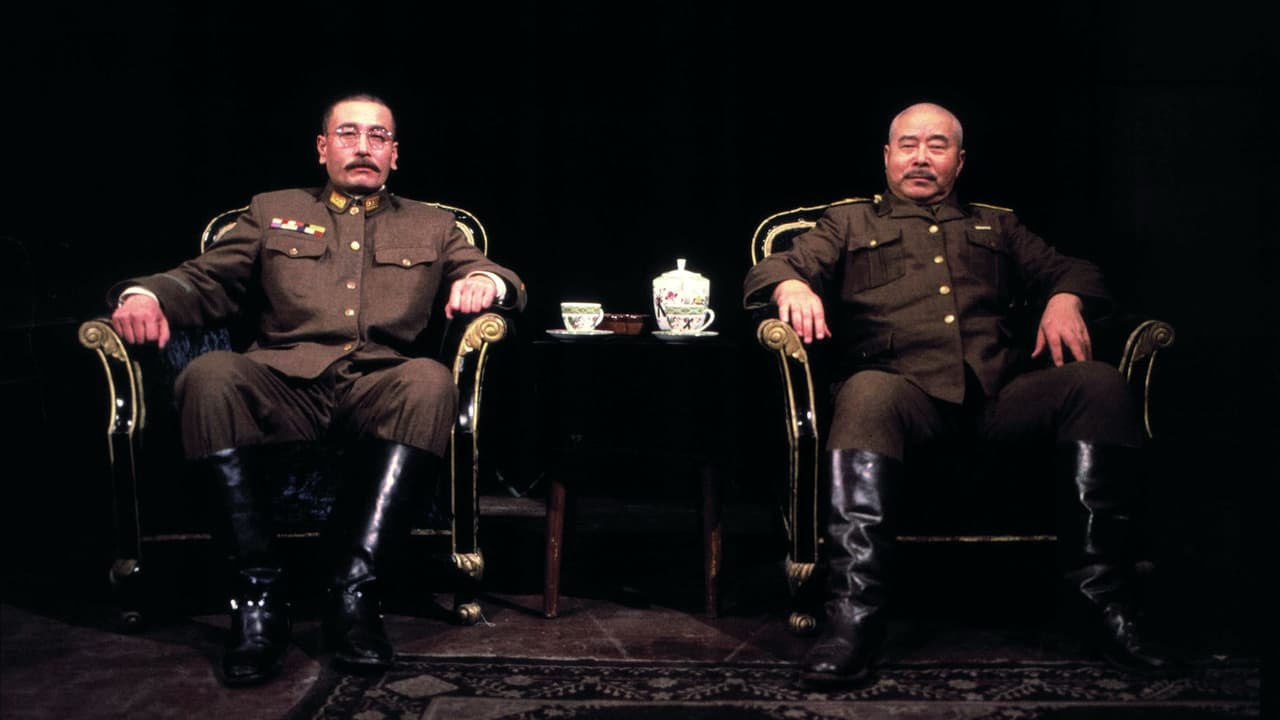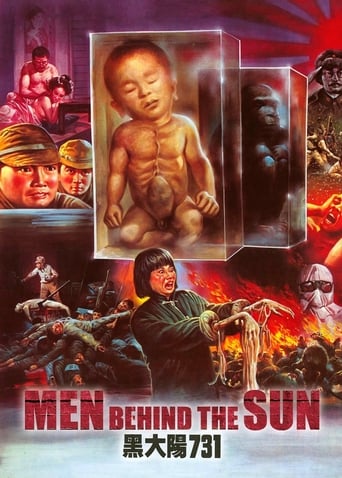

The 1988 Hong Kong-Chinese film, "Men Behind the Sun" is the first film to ever receive a "III" rating in Hong Kong. The "III" rating in Hong Kong is equivalent to the NC-17 rating in the United States. However, audiences abroad are usually not as sensitive to on-screen depictions of gruesome violence as western audiences. So the fact that this film shocked the conscience of its host country to this extent should discourage most from watching the film. It is not an easy movie to watch. The violence and gruesome content will make most viewers sick. But such a film is necessary. Because, compared to German atrocities, the international film community has not paid nearly enough attention to the atrocities committed by the Imperial Japanese Army during World War Two.In Chinese, the title of this film is hēi tài yang 731 which loosely translates into, "Black Sun: 731". The 731 is an allusion to the atrocious but mysterious Unit 731 of the Japanese armed forces which carried out unimaginable atrocities against both European and Asian populations in Imperial Japan's "conquered" territories. Make no mistake; Unit 731 is not a fictional invention of a filmmaker's imagination. Unit 731 actually existed and participated in many truly horrifying war crimes ranging from the development of chemical warfare to live human testing. The extent to which this unit utilized lethal human experimentation will perhaps never be fully known. The organizers of Unit 731 were successful in hiding their work at the end of World War Two. Most of the most heinous perpetrators of war crimes in this unit were pardoned.Unit 731 had many affiliated units. The film depicts one such unit which is made up of a group of young Japanese boys who are forced into the Imperial Japanese Army's Youth Corps. These playful boys end up serving under the cruel Shiro Ishii. Ishii doesn't care about the Japanese boys assigned to his unit. He doesn't even seem to care about his own men, let alone the Chinese people. The boys in the Youth Corps eventually lose faith in the Japanese war effort's leadership as they are exposed to horrific cruelty. These "men" behind the sun witness people being frozen alive to test how brittle limbs become when exposed to harsh temperatures. They witness a mute boy being harvested by Japanese medical researchers for his organs. Babies were separated from mothers. Women were raped to intentionally create babies that could later be used for further experimentation. Unit 731 is perhaps the darkest military unit in human history. "Men Behind the Sun", attempts to depict this tragic part of mankind's history. As the film progresses, Ishii becomes increasingly obsessed with winning World War Two at all costs, even if it means using chemical and biological weapons. As Japan loses battle after battle, Unit 731's desperation only increases. They begin to test epidemic causing bubonic plague bombs in assaults against the Chinese people around the major city of Harbin. But as everyone knows, Japan eventually lost the war. Unit 731 forsook humanity for nothing. At times, it is hard to watch and believe what is happening on screen. Such raw barbarism has very little entertainment value. But it is very informative. The cold-hearted nature and lack of empathy among the elder Japanese soldiers stands in sharp contrast to the initial optimism and playful nature of the boys in the Youth Corp. It is important to note that every atrocious moment depicted on-screen is merely a taste of the true scale and breadth of the atrocities committed by the Imperial Japanese Army during World War Two. This fact alone should make anyone feel sick. The makers of this film were criticized for making a film that had the potential to hurt Chinese relations with Japan. But as the opening of the film depicts, "Friendship is friendship; history is history".There are probably only a few films in existence that can cause people to be so horrified that they actually vomit. As a witness to this, it must be said that "Men Behind the Sun" is one such film. There are scenes in the film that were so gruesome and difficult to digest that they will leave viewers nauseated and uncomfortable. This nauseating discomfort is indeed the desired effect of this movie. It is impossible to discuss the atrocities committed during the course of World War Two without mentioning some genuinely heinous atrocities. It is even more difficult to depict such atrocities in a vivid medium as captivating as film. The makers of this film should be commended for their attempt.
... View MoreThis movie was mentioned in passing in Dr. Craig Reid's masterpiece, THE ULTIMATE GUIDE TO MARTIAL ARTS MOVIES OF THE 1970s, so I decided to check it out. My bad. "History is history," we're informed prior to the first scene- and it's in that frame of mind that I sat through this one. Needless to say, this isn't the kind of movie I could recommend to anyone other than a scholar or historian. And animal lovers beware: we see a live cat being fed to a roomful of ravenous rats (fake or not, it's a gratuitous depiction that only distracts the viewer- as is the subsequent burning-alive of these rats; which clearly was NOT faked). I have to admit that my regard for a filmmaker goes WAY down when I see them engaging in on screen animal cruelty (faked or not, because even faked depictions of this kind of thing all too often inspires the real thing): the lack of empathy is apparent, but it's the taking of a LIFE that ****es me off.
... View MoreWorld War II is the background of Men Behind the Sun. Based on the historical facts of the Japanese army using Chinese prisoners for medical experiments; the film pulls no punches, with its' graphic depictions of the cruelty inflicted by the captors. Some of the prisoners were injected with virus's to develop a form of bubonic plague for use against the civilian population. Others are tied to crosses and exposed to infected fleas. The few who attempt to escape are shot down as they run away. Much like the German's, the Japanese responsible for the atrocities, destroy the facility in order to cover up their misdeeds. The film stirred a huge controversy as an exploitation flick, but the director defended its' accuracy and use of grisly footage to get his point across. The torture scenes are horrific, the worst being a young woman tied up outside in the freezing cold as water is poured over her hands. She is later brought into a lab and forced to dunk her hands into a chemical which removes all of the flesh and all that is left is bones. The scientists watch it with no sympathy for the victim, as it is for weapons research to be used on the enemy. The point of the movie is to show that the holocaust was not limited to the Jewish population of Europe, but was a worldwide phenomenon. Men Behind the Sun is tough to watch but informative nonetheless.
... View MoreLet me first start this review by saying that "Men behind the sun" is one of the most unique amalgamations of genres, in this case that of a war movie and an exploitation movie. Just think of what happens when you cross "Salo, or the I20 days of Sodom" with the "The Great Escape" and you would hit the right ballpark. "MBTS", however, has a significant degree of difference from other exploitationers like "Ilsa" or even "I spit on your grave" and this is where the sickening strength of the film truly lies. Unlike those said movies, "MBTS" is based on real events, and the movie follows these events down to the bitter and tragic end. (With minor plot additions of course)The plot of "MBTS" follows the exploits of almost everybody involved in the Manchu-based Japanese Unit 731, the medical unit responsible for carrying out the bulk of the biological experiments via unspeakably misanthropic ways. The specimens in these experiments were not frogs or rats or even your usual guinea pigs, rather it involved real live humans and included (but not limited to) captured soldiers, domesticated animals, and even children. What makes the movie even better is that it adheres to these facts with much reverence. Mous and company, even with the lack of actual evidence, manage to recreate the gruesome set-pieces through the several eyewitness accounts. Thematically and graphically, the movie never fails. One thing that makes this particular movie stand out is the fact that it never falters from showing unspeakable acts. If one has read from the interviews of T.F Mou, the crew stopped at nothing to show the atrocities done by the Japanese, going as far as using a real corpse of a boy during the murder-autopsy scene. Such audacity went along way indeed, with the ending showing a Chinese boy, who is about to escape from the camp, getting a Japanese flag rammed through his neck. (What a subtle effort in showing cinematic symbolism)What makes MBTS even more disturbing is its efforts to achieve a linear narrative form, or in other words its effort to become more of a movie and less of a documentary. So what's the deal with that? In normal, narrative movies, the audiences are always expecting the hero to save the day, to serve the each antagonist their share of comeuppance. In this film, that never happens. The hero-villain relationship does not exist in this movie. What we have here is an Oppressor-Victim relationship. The people in the movie that manage to gain our sympathy are disemboweled, skinned alive, impaled, explode their guts etc. I must make clear that if it were a documentary, it would have been less disturbing for ME, but to see it in colored celluloid and with it trying to pass of as just another HK movie makes my blood run cold. These were real atrocities, and now we get to see them literally in the flesh.Overall, I must honestly say that MBTS surprisingly sickened me, and this is coming from a guy who has watched Baise-Moi, Ken Park, Inside, Untold Story, Ichi the Killer, Visitor Q, Poultrygeist, and A Serbian FILM. Not that those films didn't shock me, it's just that I have discovered that every extreme-film has its own unique way of twisting you. It might be a subtle attack on your violent impulses (a la Haneke's Funny Games) or something more unexpected (I really didn't anticipate the level of bloody brutality of INSIDE). With MBTS, it was a bit different. Here, I was already informed beforehand of the individual "stand-out" scenes. It turned out to be, informed or not, I was still sickened. It turned out to be that in the anticipating such scenes to happen, I could see the Chinese people in the film, innocent, unmindful, helpless, like lambs to be led to the slaughter. There could nothing be more disturbing than watching a Chinese kid in the movie happily playing not knowing that in the next scene he will be killed and systematically disemboweled.I know people will watch this for its gore content. It will suffice, but of course there will always be gorier films that this one. One thing I will say that is for sure is that if you're looking for a more intense and bleaker version of sugar-coated films like Schindler's list, this is the right movie for you. In the end, you'll feel so empty; you swear that your guts have been blown out of you via decompression chamber.In the end, it was an amazingly disturbing experience but it warrants a viewing thanks to its honest portrayal.
... View More